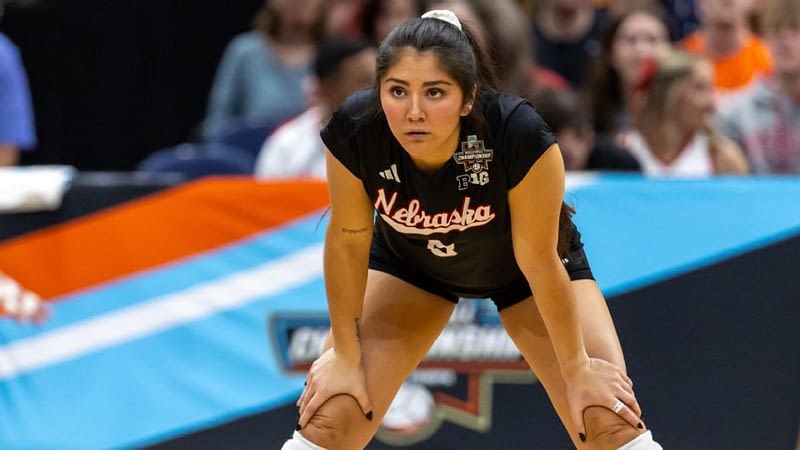The Unsung Heroes of NCAA Volleyball: Liberos in the Spotlight
Picture this: a sea of red and white jerseys on the volleyball court, but one player stands out in all black. That’s Lexi Rodriguez, Nebraska’s 5-foot-5 libero, a defensive dynamo who is redefining the role of a libero in NCAA volleyball. Across the net, towering at 6-foot-9, is Wisconsin’s right-side hitter Anna Smrek, daughter of a former two-time NBA champion. Smrek’s reach is formidable, touching higher than 11 feet when she jumps, making the 7 feet, 4 1/8 inches net seem insignificant.
Beside Smrek is CC Crawford, Wisconsin’s 6-foot-3 middle blocker, with a family legacy in sports. Her father was a Division I track athlete, her mother played Division I basketball, and her brother is a defensive lineman at Iowa. Blocking is in her blood.
As the match unfolds, Wisconsin finds themselves down by a set and trailing 5-2. They need points, and they need them fast. Rodriguez, however, is ready for the challenge. She knows the Wisconsin hitters will be coming at her with everything they’ve got, aiming to slam the volleyball onto Nebraska’s side of the net. Her mission? To prevent that from happening.
Merritt Beason steps back to serve. Rodriguez positions herself on the sideline as Smrek rises for a swing, but the Nebraska block sends it back to Beason. After a quick exchange, Crawford tips the ball over the Nebraska block toward the front corner. Rodriguez reacts with lightning speed, diving and popping the ball up just before it hits the court. She slides into the referee stand but quickly regains her position, ready for the next play.
Smrek tries again, this time aiming for an open spot on the Nebraska court. Rodriguez, undeterred, slides on her knees to dig it out. She gets back up, backpedaling to guard her territory.
Smrek isn’t done yet. She approaches with determination, slamming the ball toward the back of the court. Rodriguez stretches her arms to her right, deflecting the ball back to Wisconsin’s side. She rolls over, springs to her feet, and watches as her teammate Andi Jackson pushes the ball to Wisconsin’s side. Point Nebraska.
Rodriguez celebrates with a floor slap and a fist pump, joining her teammates in a huddle. In a rally lasting 44 seconds, she played the ball five times. Mission accomplished.
Justine Wong-Orantes, an Olympic gold medalist and former Nebraska libero, praises Rodriguez’s court coverage. “Lexi takes up so much of her side of the court,” she says. “You see her flying around, creating longer rallies and tiring out opponents because they feel like they cannot score on a libero like Lexi.”
Rodriguez is part of a new wave of liberos changing the game. Introduced to NCAA play in 2002, liberos are back-row defensive specialists who can’t attack above the net or block. They wear a different jersey color, pass with precision, extend rallies, and frustrate hitters. They dive, sacrifice their bodies, and create scoring opportunities for their teammates, blending athleticism with anticipation to keep the ball off the floor.
Wong-Orantes highlights Rodriguez’s game-reading ability. “Lexi is always in the right place,” she says. “You see a lot of defensive players who are flashy and out of position, then make a spectacular play. But Lexi is always just in the right spot, so she doesn’t need to make a tremendous dig. Her ability to read the game is elite.”
Rodriguez is one of four finalists for the AVCA national player of the year and could become the first libero to win the award. She’s also eight digs away from tying Wong-Orantes’ Nebraska record of 1,890. While she makes it look effortless, being a libero requires immense talent and courage.
Wong-Orantes recalls a tough game against Wisconsin during her freshman year. The Badgers targeted her with every serve, some hitting her shoulders, chest, and arms. To protect her, coach John Cook moved her out of the serve receive position, hiding her behind the hitters. “That was the most demoralizing feeling,” she says. “As a libero, you’re supposed to be good at passing, and being hidden was shameful. It was tough to break out of that.”
The position isn’t for the faint-hearted. Liberos at the final four have their own harrowing tales. Louisville’s Elena Scott, an AVCA first-team All-American, says getting hit in the chest or throat during practice is common and “kind of knocks the wind out of you.” She shares a fresh horror story from the Cardinals’ second-round win over Northern Iowa.
Trailing 2-1 in the fourth set, Scott dove for a ball traveling to her right. Her teammate Charitie Luper had the same idea, lunging to her left. They collided, and Scott’s arms got stuck under Luper’s body. She landed on her right side but felt pain in her left lower back.
“There was a sharp, sharp pain and burning,” Scott says. “I stopped for a bit, then pushed through because it was a big match.” She played through pain, finishing with a season-high 26 digs. Afterward, she sought treatment for her back, which remains sore as Louisville prepares for ACC rival Pitt in the national semifinals.
Pitt libero Emmy Klika knows the dangers of diving. During a match against Pepperdine, she dove for a ball and collided with teammate Valeria Vazquez Gomez, hearing her neck crack as she landed. “I was on the ground thinking, ‘What did I just do to myself?'” Klika says. “Being a libero means having a fearless attitude, but sometimes you run into someone and wonder if you hurt yourself.”
Klika, with 853 career digs, was fine but remembers the fear. Penn State junior libero Gillian Grimes, named second-team All-Big Ten, recalls a club tournament against a Texas team. An opposing hitter pounded the ball into her face. “That definitely hurt,” she says. “I thought I was concussed, but you just keep playing.”
Even Rodriguez admits fear is part of being a libero. “There are always times with an open net and a big hitter,” she says. “Those are the scariest.”
Originally Written by: Aishwarya Kumar





















